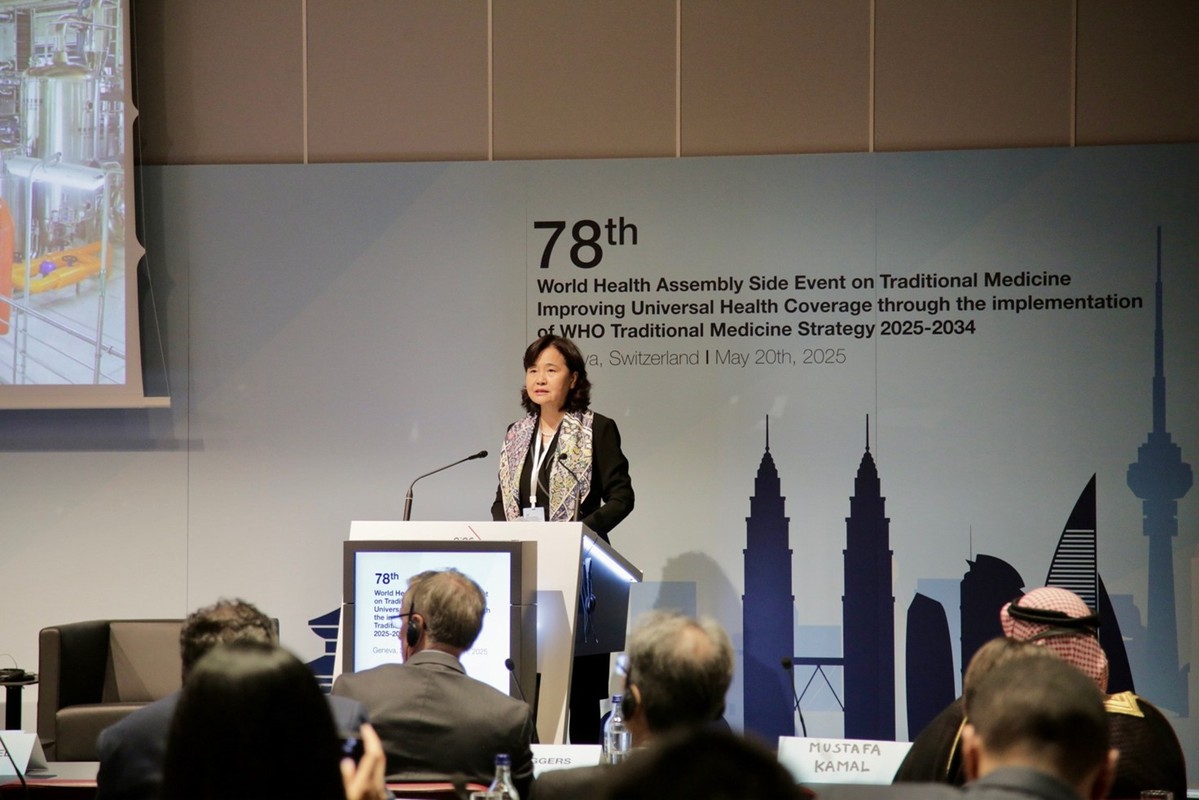Countries explore further integration of traditional medicine into health systems

China, together with Malaysia, Nepal, Saudi Arabia and Seychelles, co-hosted an event on traditional medicine on Tuesday in Geneva, Switzerland, on the sidelines of the 78th World Health Assembly, marking the first time that member states of the World Health Organization have organized a side event on this topic at the assembly.
The event drew more than 100 participants, including senior health officials, WHO representatives and leading experts and scholars, to explore the integration of traditional medicine into national health systems to advance universal health coverage and achieve sustainable development goals.
Yu Yanhong, commissioner of China's National Administration of Traditional Chinese Medicine, said in her keynote speech that China's healthcare system is characterized by the integration of Western medicine and traditional Chinese medicine, an approach that represents one of its key strengths.
READ MORE: China to develop 'digital, smart traditional Chinese medicine'
To promote TCM, China has developed appropriate regulatory mechanisms, including a law adopted in 2016 to give TCM a bigger role in the medical system while ensuring its regulated development, she said.
The TCM industry has also been embracing modern medical technologies to innovate on its theories and practices, while formulating its own strategy for management, health services delivery and practitioner training, she added.
According to Yu, TCM hospitals have been established in nearly all provinces, cities and counties across the country, and more than 90 percent of general hospitals also have TCM departments. TCM institutions in China currently handle approximately 1.69 billion outpatient visits per year.
Looking ahead, Yu encouraged countries to develop traditional medicine systems suited to their national contexts, and she called for deeper international exchanges and cooperation in jointly advancing the WHO global traditional medicine strategy.
The WHO recognizes the diversity of traditional, complementary and integrative medicine, or TCIM, practices around the world, as well as their contribution to the wellbeing of people and to universal health coverage.
The latest version of the WHO traditional medicine strategy (2025-34) will be reviewed at the WHA this year.
Rudi Eggers, director of integrated health services at the WHO, said at the event that the newest draft strategy presents four objectives: strengthen the evidence base for TCIM; support the provision of safe and effective TCIM through appropriate regulatory mechanisms; integrate safe and effective TCIM into health systems; and optimize the cross-sector value of TCIM and empower communities.
Furthermore, China, alongside France, the Netherlands, Qatar, Switzerland and Chile, also co-hosted a side event on mental health on Tuesday. The event brought together more than 140 participants, including senior government officials, leading scholars and representatives of the WHO, UNICEF and the World Economic Forum.
Jiao Yahui, head of the Bureau of Medical Administration at China's National Health Commission, said the approach to mental health has shifted from treating existing illnesses to focusing more on prevention, and from treating mental disorders to promoting overall mental well-being.
ALSO READ: China calls for global solidarity for healthy world on WHA
China is committed to contributing its efforts to building a world where everyone has access to mental health services, Jiao said.
Jerome Salomon, assistant director-general of the WHO, said that although mental health services around the world remain underfunded, with major gaps in access and quality, progress has been made in breaking down the stigma associated with mental health conditions, as well as in designing relevant services, policies and programs to ensure inclusion of those affected, among other aspects.
He urged continued engagement and commitment from countries, noting that the upcoming UN high-level meeting on noncommunicable diseases and mental health in September will be a critical moment for laying the foundation for years to come.
Contact the writer at zhengwanyin@mail.chinadailyuk.com


